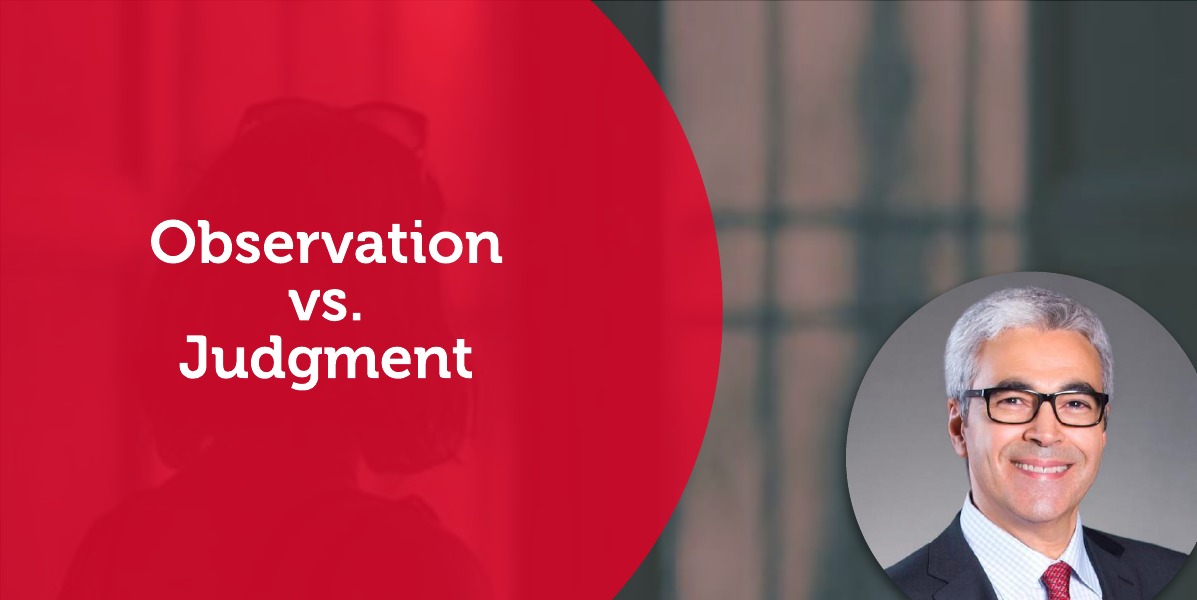
A Coaching Power Tool Created by Thierry Lacarne
(Executive Coach, HONG KONG)
Paulo Coelho, the Brazilian author, writes:
A young couple moved into a neighborhood. The next morning while they were eating breakfast, the young woman saw her neighbor hanging the washing outside.
“That laundry is not very clean; she does not know how to wash correctly. Perhaps she needs better laundry soap.” Her husband looked on, remaining silent. Every time her neighbor hung her washing out to dry, the young woman made the same comments.
A month later, the woman was surprised to see a nice wash on the line and said to her husband “look, she’s finally learned how to wash correctly. I wonder who taught her this. The husband replied:” I got up early this morning and cleaned our windows.”
Observing
Is critical – not only in coaching- but in any of our interaction with friends, family members, co-workers, neighbors. Based on www.dictionary.com definition, To observe is Perceive, Note, See, Detect, Watch someone or something carefully. The perceive we are focusing on in this Power tool is not about “fulfilling or complying with something”.
Judging
(www.awakeningself.com) Judgment is an opinion or estimate, criticism or censure, power of comparing and deciding. Judgment implies a power differential. Judgment assumes that the person judging has the power and right to determine what is good or bad in general.
Unlike observing which offers options and choices when giving feedback/guiding, judgment has a sense of finality, like a sentence being passed. When we judge we want to make others see the world as we do.
People take different roads seeking fulfillment and Happiness. Just because they are not on your roads does not mean they are lost. Dalai Lama
Application to Coaching
According to the International Coach Academy, “when we use factual comments (observations) instead of opinionated comment it is hard for the other side to disagree or behave defensively. When we observe without evaluation, we open ourselves to the other`s personal experience.”
This is so true when I recall one of my teammate student at ICA during a peer coaching session, an observed coaching session to be precise. At a certain point of our conversation, I asked “how are we doing so far” “how do you feel” and she replied “I am not comfortable, a bit tense… and wish to finish this graduation asap! Then I asked why? Do you want to share what makes you nervous? Yes, she said, this session puts me in a hell of stress, I don’t like being assessed, judged referring to the observed coaching”… She has developed that feeling just because someone was Watching!
The above example indicates that in Coaching it is vital that the Client feels right from the beginning that whatever we say, feedback it is absolutely for her/him, away from any opinionated evaluation. Such feeling is created by trust, space is given, our compliance with the ICF Ethics which includes confidentiality and respect.
Observation is a skill. Observing suggests directions, options, choices given to the client while judging creates harm. Communication is key especially the wording: Client should feel, receive our observations like positive feedback, making him/her think “this is good” “good for me”.
Feedback is a Gift and therefore what we share/deliver, should always be done with Care.
Suggested words/sentences when sharing observations:
References
Focus, the hidden driver of Excellence, Daniel Coleman, HARPER Editions,2013
https://learnsite.icacoach.com
www.shari-alexander.com
www.awakeningself.com
www.mission.org